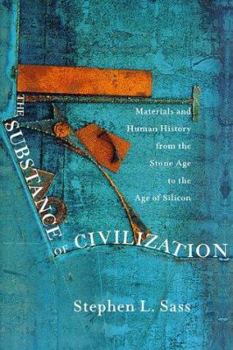The Substance of Civilization: Materials and Human History from the Stone Age to the Age of Silicon
Select Format
Select Condition 
Book Overview
The story of human civilization can be read most deeply in the materials we have found or created, used or abused. They have dictated how we build, eat, communicate, wage war, create art, travel, and... This description may be from another edition of this product.
Format:Hardcover
Language:English
ISBN:1559703717
ISBN13:9781559703710
Release Date:February 1998
Publisher:Arcade Publishing
Length:291 Pages
Weight:1.30 lbs.
Dimensions:1.1" x 5.9" x 8.6"
Customer Reviews
4 ratings
A Great!
Published by Thriftbooks.com User , 19 years ago
I have read a vast quantity of books in my lifetime and believe that I have come across several great classics that fell through the cracks. This is one of them. There is hitch to this! It is parallel to the fate of The Jungle by Upton Sinclair. The Jungle was written to agitate social change and hit the literal stomach instead. The Substance of Civilization was written for light scientific interest and hit the survivalist instinct instead. I came across this book during the time of Y2K concerns. This is a pertinant survivalist handbook. It is how to start an economy from the literal dirt. I think this book draws the standard or baseline in answering, "How much science does an adult survivalist need to know?" Some people will find themselves short of science to meet this reasonable standard of scientific literacy. (I recommend the Beka science text books sold at Christian Liberty starting with the 4th grade. I think that is the one that teaches you how to measure the temperature through the use of a cricket. The 4th grade science book without meaning to unwinds those long descriptive garden walks in British 19th century novels. A reader is a little more clued in.)
History is an alloy....
Published by Thriftbooks.com User , 19 years ago
"History is an alloy of all the materials that we have invented or discovered,manipulated,used,and abused,and each has its tale to tell." These are the words of the author,a professor of material sciences at Cornell University.He is obviously in love with the subject he teaches.He reminds me of one of my Chemistry professors who was in the lab on a Saturday afternoon when a student happened to come by,and said;"Do you have to work on Saturday's?" He replied;"Son this isn't work,it's my hobby." Reading this book,one gets the feeling you are just having a friendly discussion with him about the subject that is his work,interest,fascination,and most of all what his love resolves around.Just the opposite of a Librarian I was having a social chat with one day.I asked what she liked to read;and the reply stunned me."I really don't like to read much;I get too much of it at work every day". Sass is a very good writer,particularly considering his profession.I don't say this as a slur;but generally good ,interesting writing is not the strong point of technical people.Carl Sagan is a great exception to this,and it shows Sass loves materials like Sagan loved the universe.Although I am an engineer,took courses in materials;I never heard them talked about like this. Sass shows how materials have influenced civilizations from the Stone Age to the present time and will continue to do so for the future.Not only that,but there will be materials invented at an astonishing rate,even more so than the last half century.Just imagine the things that have become commonplace in that time and how much their existance is dependent on space age materials.Dreams are the ideas behind inventions;but materials are what makes them happen. I read a lot of history,and particularly of warfare.I always believed that the one with the best weapon always wins the war.Now,after this excellent book,I have come to believe that the best weapon entails having the best materials to build them with.A great read.
What a terrific book!
Published by Thriftbooks.com User , 20 years ago
Wow. I found this book more interesting than any other I've read in the last couple of years. It's a great introduction to an interesting field on which few people ever focus. I'm a recovering English major who studied very little science in school but have been reading more science as an adult. But, of course, I've been limited by my lack of the technical background most science writing demands. This book (while it certainly doesn't ignore the science) does a reasonably good job of conveying the substance of the scientific principles involved in the field in a non-technical way (though I'll admit to some moments of saying "well, I THINK I understand what that meant.") But what I really enjoyed is the way in which the author conveyed some of the historical and economic importance of materials science -- raising issues such as why the Romans didn't have steel or how a misunderstanding of the structure of aluminum had a direct impact upon the economy of post-WWII England. After finishing the book, I feel I have a new way of looking at the man-made world and an appreciation of its complexity that I'd missed before.
Fascinating reading for anyone
Published by Thriftbooks.com User , 25 years ago
Good historical overview of materials,interspersed with just enough scientific writing to keep the scientifically inclined layman interested. This book is a fascinating account of how civilization discovered and in turn was shaped by the most prosaic of things: The underlying, physical building blocks (I especially loved the discussion of the genesis of steel and its effects). I read it three times and bought two copies to give away as presents





